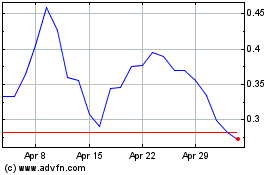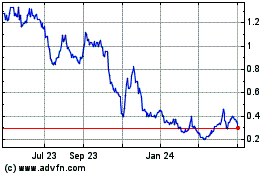Investigational Anti-Cancer Drug, Phenoxodiol, Produces Promising Results in Women with Recurrent Ovarian Cancer
February 09 2004 - 8:28AM
PR Newswire (US)
Investigational Anti-Cancer Drug, Phenoxodiol, Produces Promising
Results in Women with Recurrent Ovarian Cancer Study at Yale
University Supports Development of Phenoxodiol As a Drug to Restore
Chemo-sensitivity in Non-responsive Women SAN DIEGO, Feb. 9
/PRNewswire-FirstCall/ -- Researchers from Yale University School
of Medicine reported preliminary results of a dose-finding study in
women with recurrent ovarian cancer using phenoxodiol, an
investigational anti-cancer drug being developed by Marshall
Edwards, Inc. (London AIM: MSH). This early clinical testing
supports the ability of phenoxodiol to act as both an anti-cancer
agent in its own right and a chemo-sensitizing agent that restores
responsiveness of ovarian cancer cells to standard chemotherapies.
Phenoxodiol is an investigational drug and has not yet been
approved for marketing in the U.S. The data were presented
yesterday at the 35th Annual Meeting of the Society of Gynecologic
Oncologists. Phenoxodiol as Monotherapy The datareflect outcomes
from the first 20 of 40 measurable subjects at the first two doses
tested in a dosing study to evaluate the effect of certain doses of
phenoxodiol on disease progression and tumor response in women with
recurrent disease that has become unresponsive to standard
chemotherapy. According to the Yale researchers, of the 20 subjects
who started the drug course, 13 were able to finish a three-month
cycle, and five of the 20 subjects (25 percent) were considered to
have had disease stabilization. All patients ultimately showed
disease progression. However, no toxicity was attributed to
phenoxodiol at the two dosing levels reported at this time.
Complete data from this study is not yet available according to the
Yale researchers, and will be presented at a later date. While
pre-clinical studies of phenoxodiol have shown the ability to stop
ovarian cancer growth in animals in its own right, the Yale
researchers and the drug's developer, Marshall Edwards, Inc., are
developing the drug in late- stage ovarian cancer as a
chemo-sensitizer, restoring the sensitivity of the cancer cells to
the cytotoxic action of standard chemotherapeutic drugs, in the
expectation that that form of usage would deliver a greater
anti-tumor effect in such advanced cases of cancer. "Patients
received phenoxodiol twice a week, which is how we believe it will
be used in combinational therapy," said principal investigator
Thomas Rutherford, M.D., Associate Professor of Gynecology and
Reproductive Sciences. "We didn't expect to see a major anti-tumor
effect when used at this dose, so it is encouraging to see an
apparent 25 percent stability rate in such unresponsive cancers.
These results give us confidence in the potential use of
phenoxodiol for the treatment of ovarian cancer. We are highly
encouraged by this outcome." Phenoxodiol with Subsequent
Chemotherapy In an interim analysis of the entire study of 40
patients, where the Yale researchers focused on paclitaxel
challenged patients, the researchers observed that eight of nine
patients who were treated with paclitaxel following completion of
the phenoxodiol trial showed marked, declining levels of CA-125, a
tumor marker for ovarian cancer. Four of these patients had
previously been defined as paclitaxel resistant. "This is a
preliminary finding only, but one that we find highly encouraging
because it supports in humans what we saw in the laboratory -- that
phenoxodiol is a powerful chemo-sensitizer," said Gil Mor MD, PhD,
Associate Professor and a co-investigator in the study. "Our
experience is that few patients respond to follow-up therapy with
taxanes once they have developed chemo-resistance, so to see this
result is very encouraging." Pre-clinical studies in cells and in
animals showed that phenoxodiol was able to induce in
chemo-resistant ovarian cancer cells susceptibility to being killed
by extremely low doses of standard drugs such as cisplatin and
paclitaxel. Dr. Graham Kelly, Executive Chairman of Marshall
Edwards, Inc., said, "We will be commencing a formal combinational
study in ovarian cancer patients within the next couple of months.
That will be the first time that we will have had the opportunity
to use the drug the way that we believe it should be used. The
current study has been useful in demonstrating the benefit of low
doses of phenoxodiol, and we will be using the same low dose that
has shown such promise in the current study." According to the
Ovarian Cancer National Alliance, ovarian cancer is the deadliest
of the gynecologic cancers, and is the fifth leading cause of
cancer death among U.S. women. Currently, 50 percent of the women
diagnosed with ovarian cancer die from it within five years,
largely because the cancer ultimately develops resistance to
standard anti-cancer therapies. Marshall Edwards, Inc., is
developing phenoxodiol both as a monotherapy for the treatment of
early-stage cancers (e.g. cervical, vaginal and prostatic
adenocarcinomas) and as a chemo-sensitizer in combinational therapy
for late- stage cancers (e.g. ovarian, prostate, renal, pancreatic
carcinomas). Marshall Edwards, Inc., manages its international
research and development programs using the expertise and clinical
research capabilities of universities and hospitals in the U.S.,
Australia and Europe. Marshall Edwards, Inc., has licensed rights
to bring phenoxodiol to market globally from its parent company,
Novogen Limited. (NASDAQ:NVGN). Novogen is developing a range of
therapeutics across the fields of oncology, cardiovascular disease
and inflammatory diseases based on its phenolic drug technology
platform. More information on phenoxodiol and on the Novogen group
of companies can be found at http://www.marshalledwardsinc.com/ and
http://www.novogen.com/. Statements included in this press release
that are not historical in nature are "forward-looking statements"
within the meaning of the "safe harbor" provisions of the Private
Securities Litigation Reform Act of 1995. You should be aware that
our actual results could differ materially from those contained in
the forward-looking statements, which are based on management's
current expectations and are subject to a number of risks and
uncertainties, including, but not limited to, our failure to
successfully commercialize our product candidates; costs and delays
in the development and/or FDA approval, or the failure to obtain
such approval, of our product candidates; uncertainties in clinical
trial results; our inability to maintain or enter into, and the
risks resulting from our dependence upon, collaboration or
contractual arrangements necessary for the development,
manufacture, commercialization, marketing, sales and distribution
of any products; competitive factors; our inability to protect our
patents or proprietary rights and obtain necessary rights to third
party patents and intellectual property to operate our business;
our inability to operate our business without infringing the
patents and proprietary rights of others; general economic
conditions; the failure of any products to gain market acceptance;
our inability to obtain any additional required financing;
technological changes; government regulation; changes in industry
practice; and one-time events. We do not intend to update any of
these factors or to publicly announce the results of any revisions
to these forward-looking statements. DATASOURCE: Marshall Edwards,
Inc. CONTACT: Chris Naughton of Marshall Edwards, Inc., Australia,
011-61 2 9878 0088, or David Sheon, USA, +1-202-518-6384, for
Marshall Edwards, Inc. Web site: http://www.novogen.com/
http://www.marshalledwardsinc.com/
Copyright
Kazia Therapeutics (NASDAQ:KZIA)
Historical Stock Chart
From Jun 2024 to Jul 2024

Kazia Therapeutics (NASDAQ:KZIA)
Historical Stock Chart
From Jul 2023 to Jul 2024
